My Tory conference begins with an act of civil disobedience. Travelling on a train rammed with Tory delegates is thirsty work, and well over an hour into the journey, the buffet car still shows no signs of opening. A young Tory councillor stands with an irritated but resigned look on her face, playing with her mobile, muttering that the conductor had promised it would open 20 minutes in. After conferring with a senior bod working for the rightwing thinktank Policy Exchange, I suggest taking the initiative: I’ll make us tea, and we’ll leave the money behind the counter. “A people’s revolution against privatised rail!” he suggests rousingly, amused to be engaging in direct action with a socialist. “I say, are you speaking at conference, Owen?” one delegate inquires with a smirk. Others on the train begin spreading scurrilous rumours that I am travelling in first class, forcing me later to produce my train tickets.
And so begins a frankly surreal few days. My presumption is that I will be a circus freakshow (as one Tory tweeter suggests: “ROLL UP, ROLL UP, SEE THE AMAZING SOCIALIST BOY! THRILL AS HE RALLIES! WONDER AS HE REDISTRIBUTES! QUAKE AS HE RENATIONALISES!”). But rather than experiencing a wave of hostility, I am treated more like a zebra walking down the high street: a freakish novelty. There are mass requests for selfies, which no doubt end up being posted on Facebook with ironic comments.
There is, however, plenty of hostility on display from the leftwing activists assembled in Manchester. As I walk in to conference, blue “Conservative Friends of India” lanyard around my neck, I endure the rather novel experience of being called “Fucking Tory scumbag!” As I turn to confront my detractors, one man continues to angrily jab the air, yelling, until he realises he’s only causing collateral damage. “Oh, sorry Owen!” he says sheepishly, while another asks what on earth I am doing there. Good question, I think, as I pass through the security gates of the Ring of Steel.
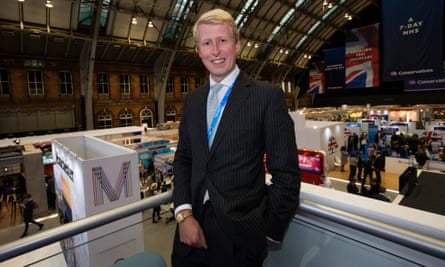
Not that everyone inside is devoid of sympathy for the furious protesters. George Grant is a very personable, 30-year-old former parliamentary candidate who stood against George Galloway – “when your first statement as a parliamentary candidate is in favour of your Labour opponent, you know you’re in a slightly strange fight” – and cuts a 1950s-style patrician Tory figure. With his long blond eyelashes and slightly ruddy face, I wonder aloud if he has ever been mistaken for a relative of Boris Johnson. “Very amusing, Owen,” he says with a sigh. “Just occasionally. One or two very unwitty people. I’ve had that, I’ve had Prince William. He’s balding!” Grant went to speak to members of the sort-of-anarchist group Class War, earning their respect. “You’ve got balls as big as fucking watermelons for being here, mate!” they told him, offering him coffee.
Grant says some of the protesters are “mad, bad, dangerous to know, and need a good bath”. But others, he admits, are “desperate”. One girl couldn’t get a job because of anxiety and depression. “She pulled up her top, and she’d got a bone sticking out behind the skin, under her ribs. Her older brother had jumped on her as a child, broken her ribcage and her collarbone, and her mother hadn’t even taken her to hospital, so it had healed like that.” He met another person, a former healthcare worker who uses a wheelchair, “now in very poor health and clearly incapable of work; the welfare reforms had clearly been affecting her”. Whenever she went into remission, they tried to put her into work. “So obviously there are people for whom the reforms are failing. They may be exceptions that prove the rule, but they are exceptions nevertheless, and they are people.”
What hits you straight away is that there seems to be a dress code. Almost everybody is wearing a very similar-looking suit. “An army of clones!” one Tory activist jokes to me. Lance Payton, a freelance hairdresser in his late 40s from Bath, who joined the Tories seven years ago, is one exception in his green-and-pink tartan suit. Incredible dress sense, I tell him. “Thank you very much! Cost me a lot of money. It’s English! I got it on the high street.” They’re not dressed very excitingly here, are they? “They’re not! And I think it’s a real shame, isn’t it? Because why should the suits be boring? People are probably in their own comfort zone. You can’t knock that, I suppose.” It is a largely white conference, predominantly male, though there is a surprising diversity in age.

A former Tory councillor in his late 70s is full of youthful vigour: a svelte chap with striking angular features, he approaches me to say that I’m lovely and he wants to put his arms around me. He has been in the party for 60 years, saying the Tories “are the party that serves the people, the party that serves the country”. He tries to reach across the political divide. “I love some of your ideas! That’s part of the Conservative cause: to stand up for people who are poor and need their support. I think the lefty concept is just completely ridiculous!” How does slashing tax credits for supermarket workers and cleaners fit with that, exactly? “That is an anxiety,” he says, acknowledging that despite an increased minimum wage and raised tax threshold, “there is still a gap. I’d like it addressed in the autumn statement.” At the end of the conversation, I shake his hand to say thanks, and he leans in to whisper: “I wish your hand was on something else!”
George Osborne is the most popular choice for next Tory leader among those I speak to. In his speech on Monday, he makes an audacious raid on Labour territory, claiming the Tories are now the “true party of labour”. He is very much to the liking of 33-year-old Simon Kitchen, who stood in Newcastle Central for the Tories (“That’s not a Geordie accent?” “It is man! Why aye man!”). “Osborne grew up in London, he’s definitely a metropolitan Conservative, and he’s socially liberal, as I am,” he says. Kitchen works for a charity, and his whole family are Labour. “My dad is a community activist, he’s a Corbyn fan.” Do they try to steer away from contentious political issues? “No! We talk about it all the time. It’s good fun. He was going to run against me when I ran for parliament in Newcastle Central.” This takes me slightly aback, but Kitchen finds it very amusing. “When he realised he had to put a deposit down and it would make a news story and he would probably end up raising my profile, he decided not to. I support Leeds United, so I was either going to follow his politics or his football.”
Twenty-two-year-old Oliver from south Derbyshire also has to endure political disagreements with his nearest and dearest. His boyfriend is a “raging lefty”, he tells me. How does that work? “Perfectly fine! We talk about politics all the time!” Doesn’t that get a bit … tetchy? “Sometimes! We always kiss and make up.” His leadership suggestion is a wildcard: Penny Mordaunt, a Royal Navy reservist who caused a bit of a stir last year when it was revealed she had inserted “cock” repeatedly into a parliamentary speech for a dare. “She’s a very strong woman,” Oliver says. “She has worked to get where she is now; a true blue-collar Conservative.” When I approach Mordaunt, she politely tells me she is doing no media, and suppresses a smile when I tell her of her burgeoning leadership supporters.
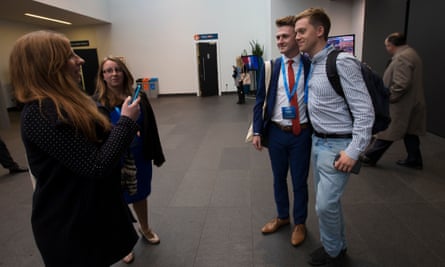
On Tuesday, Theresa May incurs the wrath even of the Telegraph because of her inflammatory anti-immigration keynote speech, a tirade somewhat oddly entitled “a beacon of hope”. Many of the delegates are happy with it, but there are exceptions. When I ask 25-year-old Rory White-Andrews – a corporate finance lawyer in the City – how he feels about it, his response is instant and brutal. “Disgusting. I think immigrants contribute a huge amount to this country and frankly we need more people coming in. I thought it was horrible.” Is that it for her leadership ambitions, I ask? “I would hope so, but she doesn’t seem to be going anywhere.”
The atmosphere is peculiar. “It’s remarkably flat, complacent,” says White-Andrews. Nearly everyone I speak to admits to having been deeply surprised when the Tories pulled off an absolute majority in May. Conor Allcock, 17, says he felt “smug” about it. “I watched my socialist parents – they weren’t very happy” – particularly about his loud-and-proud smugness. “I think the atmosphere is one of muted celebration,” counters Mark Wallace, the energetic editor of the deeply influential website ConservativeHome. “I think people are very, very aware that we got this surprise majority, the first one for two decades. They’re delighted, but they realise it would look incredibly bad if they were popping corks all over the place.”
Liam Fox, an ex-minister and a flagbearer for the Tory right, is sipping beer and mingling with activists in the foyer of the Midland hotel; his adviser takes no chances and turns on a voice recorder to make sure I’m not stitching up his boss. “People understand that they won an election that they didn’t really expect to win outright, but they are still a little bit discombobulated by the Corbyn phenomenon. Like Labour MPs, they’re not quite sure what to make of it yet.” Does he worry that the upcoming EU referendum will tear the party to bits? “The task in the second half of the parliament will be holding the party together in the referendum, and that very much depends on how we treat each other. People who want to stay in the EU are not traitors to the country, and people who want to leave are not idiots.” Is he going to stand for leader, as he has in the past? “Too many ‘ifs’ in that question! I’ll wait and see – none of us knows what the political landscape will look like after the referendum.”
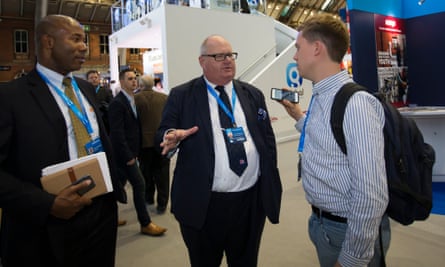
A very jolly-looking Eric Pickles – complete with spotted handkerchief – strides past the conference centre foyer. The former secretary of state for communities and local government was once a communist. “I know! Before you!” (Only afterwards do I realise he thinks I’m a communist.) Why did he flirt with communism? “I’m from a very solid Labour family,” he says. My great-grandfather helped form the Independent Labour party; had a role in the co-operative movement. But my family weren’t particularly political.” He read Das Kapital – “I know! As a kid!” – and by his 16th birthday, he was devouring Trotsky’s History of the Russian Revolution. He joined the Conservatives as a protest against the Soviet invasion of Czechoslovakia. I thought: ‘What’s the most outrageous thing I could do? I’ll become a Tory briefly!’ But I stayed; I gradually moved to the right.”
How would his younger communist self have reacted to meeting his older Conservative cabinet minister incarnation? “He’d be just a little shocked! My grandfather once said – and this was years before I joined the party – ‘That lad will turn out to be a Tory,’ and turns out he was right!” The Tory-led Local Government Association suggests that local authorities cannot take more of the cuts that Pickles’s old department has imposed, but he is dismissive. “They’ll be just fine! Local authorities are one of the most resilient parts of our constitution.”
The Tories’ claim to be the “party of labour” is somewhat undermined by cuts to tax credits that will leave – according to the Institute for Fiscal Studies – 3m lower-paid households well over a grand worse off. Late on Monday night in the Midland hotel, I find myself arguing about it with slightly merry delegates. Most are guarded, but one suggests that losing £1,000 is not a big problem: a bit out of touch, I suggest? He responds with a lecture on the need for the government to spend no more than it earns. Not everyone is happy, though. Richie Hardcastle is a bespectacled 18-year-old Tory activist from Essex with a Dolce & Gabbana belt; he became a Tory because “in school, people were basically taking the mick out of my background for not being working class”. For him, Toryism is “not about punishing the poor”. Is he worried about tax credits, then? “Yes, I am – 100%.”
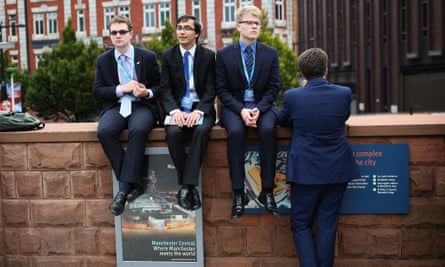
There are lots of fresh-faced Tories here, such as 16-year-old Liam Bones. Aren’t young people – suffering from student debts, the housing crisis and falling incomes – getting a raw deal? “No, not at all.” Surprisingly, he chooses the scrapping of student grants for poorer students in favour of loans as a case in point. “They teach young people that you’re not just going to be given things. So when they get older, they’re striving to be better people.” Isn’t that just saying debt is good for people? “It’s better than money just being given out.” What about collapsing homeownership among young people, I put to his 18-year-old friend Yasmine West. How does student debt help them save for a deposit? She pauses. “We don’t have … all the right answers. But it’s something the government is working on, and trying to make a difference.”
Truth is, protests aside, there isn’t much buzz at conference. “It’s boring, isn’t?” complains one ITV cameraman. “Not much in the way of stories here. That’s why such a big deal is being made about the protests. I suppose that’s how they like it, though, don’t they?” He points to the slightly Orwellian-looking Tory slogan: “Security, stability, opportunity.” It is certainly a clever tack: to be deeply ideological, but to portray it as workmanlike, dull-but-effective statesmanship. As I leave the conference zone in the early hours, three young Tories give me a cheery greeting. How are they feeling, I ask? “Well, we’re ruling.” “Hear, hear!”
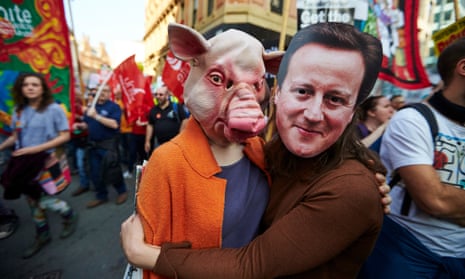
Comments (…)
Sign in or create your Guardian account to join the discussion